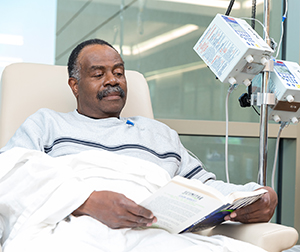Cancer of Unknown Primary: Chemotherapy
Cancer of Unknown Primary: Chemotherapy
What is chemotherapy?

When might chemotherapy be used for cancer of unknown primary?
Chemotherapy drugs travel through your blood to reach cancer cells throughout your body. This can help treat cancer of unknown primary (CUP). Chemotherapy can also kill cancer cells that still may not have been found.
This treatment can shrink tumors. It can also help ease symptoms the cancer is causing. It may even make some tumors go away. In some cases, it may help people live longer.
How is chemotherapy given for cancer of unknown primary?
You may take chemotherapy for CUP as a pill you swallow. Or may be injected into one of your veins. Then the medicine spreads through your body to kill cancer cells. The medicine you receive depends on the area of your body where the cancer first showed signs. Your healthcare provider may give you chemotherapy to try to cure CUP. Or you may get it to try to slow the growth of the cancer.
Chemotherapy is often given as two or more medicines. The medicines used will depend on where the cancer has spread to and what other health issues you have. They’ll also depend on the toxic effects the chemotherapy may have and where in your body the cancer most likely started. Common drugs used to treat CUP include the following:
Taxol (paclitaxel)
VePesid or VP-16 (etoposide)
Cisplatin or carboplatin
Taxotere (docetaxel)
5-FU or Adrucil (fluorouracil)
Gemzar (gemcitabine)
Oxaliplatin
Capecitabine
What are common side effects of chemotherapy?
Chemotherapy affects both normal cells and cancer cells. Side effects depend on the type and amount of medicine you take. Ask your healthcare provider which side effects to watch for.
Common side effects of chemotherapy include the following:
Appetite loss
Blood count changes
Bruising and bleeding
Diarrhea
Hair loss
Infection
Mouth sores
Nausea and vomiting
Tiredness
Ask your healthcare provider what you should expect. Also, ask what can be done to help ease side effects.
Working with your healthcare provider
It's important to know which medicines you're taking. Ask your healthcare team how they work and what side effects they may cause.
Talk with your healthcare team about what signs to look for and when to call them. For instance, chemotherapy can make you more likely to get infections.
It may be helpful to keep a journal of your side effects. Write down physical, mental, and emotional changes. A list will make it easier for you to remember your questions when you go to your checkups. Work with your healthcare team to make a plan to manage side effects.
Updated:
February 22, 2018
Reviewed By:
Gersten, Todd, MD,Image reviewed by StayWell art team.,Stump-Sutliff, Kim, RN, MSN, AOCNS